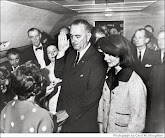I began writing this on November 22, 2021. For me and many of my generation, November 22 will forever be remembered as the day President Kennedy was assassinated. I was ten years old – a fifth grader at Emerson Elementary School. I was a member of the school safety patrol, and when I first heard the news, I was on duty with another safety patrol member, standing at the school gate as students were being dismissed. “Kennedy’s been shot!” yelled a passing student. “Yeah, right,” my partner yelled back. “He probably got a shot in the arm – so he won’t get sick.”
But no, as the story unfolded, we learned it was a
gunshot. John F. Kennedy was dead. Lyndon Baines Johnson was sworn in as the
new President on Air Force One. Our fifth-grade teacher, Mrs. Merisko, took it
particularly hard. She had autographed pictures of the three Kennedy brothers,
John, Robert, and Edward, posted on the walls of our classroom. Life changed in
an instant in ways we could only guess.
Kennedy had defeated Richard Nixon by the narrowest of
margins. A second term was far from assured. Would Kennedy have defeated arch
conservative Barry Goldwater in a landslide as Johnson did? How much of
Johnson’s victory was a sympathy vote for the assassinated President? Would
Kennedy have been able to pass the landmark social legislation that Johnson was
able to get through Congress? Would Kennedy have escalated U.S. involvement in
the Viet Nam War that tore the country apart and allowed Nixon a second shot at
the Presidency?
 Many have speculated about where this country would be
today had Kennedy not taken that fateful trip to Dallas in November of 1963.
But history does not consist of “what ifs” or “might have beens.” History
records what actually happened.
Many have speculated about where this country would be
today had Kennedy not taken that fateful trip to Dallas in November of 1963.
But history does not consist of “what ifs” or “might have beens.” History
records what actually happened.
First implemented by Nixon, the Republican party
gained converts in America’s South by subtly appealing to racial fears and
prejudices. Nixon spoke of “law and order” and opposed busing to achieve racial
integration in schools. A few years later, Ronald Reagan continued that
Southern Strategy by invoking the image of a welfare queen who drove a Cadillac
and a “strapping young buck” who collected food stamps. He used these images, arguing
for the need to cut social programs perceived as benefitting African Americans.
Next, George H.W. Bush’s 1988 campaign ran the infamous Willie Horton ad
to garner support from racist whites in the south. Then, after America elected
its first African American President, Donald Trump rode a wave of backlash,
saying out loud what former Republican candidates had only hinted at.
Trump insisted that Barack Obama was not eligible to be President, claiming without evidence that Obama was not born in the United States. Mexican immigrants according to Trump were bringing drugs and crime to the United States. Muslims should be banned from entering this country, and immigration laws should be changed to minimize entrants from “shithole countries.” When white supremacists demonstrated in Charlottesville, Virginia and were confronted by counter-protesters, Trump spoke of “very fine people on both sides.” These are just a sampling of his statements appealing to the basest instincts of his supporters and dividing the country. Though Trump was defeated in seeking a second term, he remains the acknowledged leader of the Republican party and the likely nominee for the 2024 election.
So, what sort of America would we have if John F.
Kennedy had not died that fateful day in 1963? And where would we be if Robert
Kennedy had not been killed, but rather had defeated Nixon in 1968? And what
changes in our history would have occurred had Martin Luther King and Malcom X
not been felled by an assassin’s bullets? Would the deep divisions that now
exist in this country have occurred?
Perhaps there is a parallel universe where all these
men survived that will someday be discovered to answer all these questions. But
absent that discovery, history will record only what happened in the 58 years
since Kennedy died. And where the future takes us will depend on whether we choose
leaders that work to heal the divisions that have been created during those
years or leaders who seek power by widening them.

